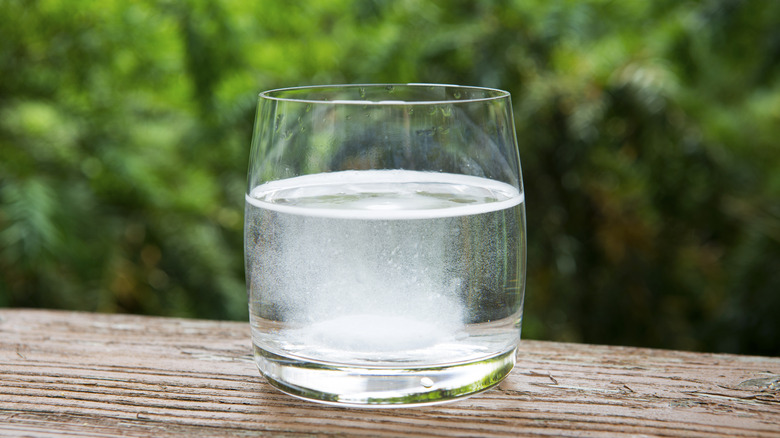Strong Vs Weak Acids And Bases
Whether acids are strong or weak is determined by how readily they dissociate to form ions. In water, acids dissolve to form hydrogen ions, while bases form hydroxide ions. The ions of strong acids and bases easily dissociate to completely dissolve in water, forming H hydrogen ions with a charge of plus one or OH- hydroxide ions with a charge of minus one. Weak acids and bases only partially dissociate, leaving fewer ions in solution. The hydrogen ions for acids and the hydroxide ions for bases give acids and bases their characteristics and determine their strength.
Is HF a Strong Acid?
Is HF a Strong Acid?
HF (hydrogen fluoride, or hydrofluoric acid) is not a strong acid. It is a weak acid because it does not make many hydrogen ions available when it dissolves in water. When HF dissolves, some of the hydrogen atoms form hydrogen ions with a positive charge, and some of the fluorine atoms form fluorine ions with a negative charge. The bond between hydrogen and fluorine is strong, so not enough HF molecules dissociate to produce the large number of ions required for a strong acid. Instead, the hydrogen atoms stay linked to the fluorine atoms, and comparatively few hydrogen ions are available to give the hydrogen fluoride solution the characteristics of an acid.
Is NH3 a Strong Base?
Is NH3 a Strong Base?
NH3 (ammonia) is not a strong base. It is considered a weak base because, in solution, it does not generate many hydroxide ions. Although ammonia has no oxygen atoms in its molecule and therefore can't dissociate into hydroxide ions directly, when dissolved in water, the NH3 molecule attracts a proton to form an ammonium ion, NH4. The proton is taken from the H2O water molecule, leaving an OH hydroxide ion with a negative charge and an ammonium ion with a positive charge. The hydroxide ions in water make NH3, a base, but only a few of the ammonia molecules take part in this process. Because there are few resulting hydroxide ions, ammonia is a weak base.
Is HNO3 a Strong Acid
Is HNO3 a Strong Acid
HNO3 (nitric acid) is a strong acid. This is because it dissociates completely in water. The molecule is made up of a hydrogen atom, a nitrogen atom and three oxygen atoms. In the chemical reaction that formed the nitric acid molecules, the electron from the hydrogen atom is shared by the nitrogen-oxygen atom combination. The resulting bond to the hydrogen atom is comparatively weak, and the hydrogen atom dissociates itself from the nitric acid molecule when dissolved in water. Due to the weak bond, almost all the molecules of nitric acid form hydrogen ions with a positive charge and NO3 ions with a negative charge, creating a strong acid.
Is NaOH a Strong Base?
Is NaOH a Strong Base?
NaOH (sodium hydroxide or lye), is a strong base. In NaOH, the oxygen atom has received the single electron from the outer electron shell of the sodium atom and is sharing the electron from the hydrogen atom to form the compound. As a result, the hydroxide ion has a negative charge of one, and the sodium ion with a charge of plus one is attracted to it. In solution, the polar water molecules with an oxygen atom at one end and two hydrogen atoms at the other end pull apart the NaOH ions. The hydroxide ion with a negative charge and the sodium ion with a positive charge dissociate completely, resulting in a strong base.
Is HCN a Strong Acid?
Is HCN a Strong Acid?
HCN (hydrocyanic acid) is not a strong acid. It is a weak acid. The hydrogen, carbon and nitrogen atoms are linked to form the HCN molecule by the covalent bonds of their electrons. There are a total of 10 valence electrons available for chemical reactions in the outermost electron shells of the three atoms, with hydrogen contributing one, carbon four and nitrogen five. The carbon atom shares one electron pair with the hydrogen atom and three with the nitrogen atom, while one nitrogen electron pair remains unshared. When placed in solution, the covalent bonds remain active, with the bond between the carbon and hydrogen atoms limiting hydrogen ion dissociation. As a result, only a few hydrogen ions enter the solution. Hydrocyanic acid is a weak acid.
Is HCL a Strong Acid
Is HCL a Strong Acid
HCL (hydrogen chloride) is a strong acid. This is because it becomes hydrochloric acid when dissolved in water. The hydrogen and chlorine atoms form a covalent bond, but the hydrogen atom is not held strongly. As a result, in water, the hydrogen atom forms a hydrogen ion, dissociating from the chlorine atom and leaving it as a chlorine ion with a negative charge. Because HCL completely dissociates when dissolved in water and all the hydrogen and chlorine atoms of HCL form hydrogen and chlorine ions, hydrochloric acid is considered a strong acid.
Cite This Article
MLA
Markgraf, Bert. "Strong Vs Weak Acids And Bases" sciencing.com, https://www.sciencing.com/strong-vs-weak-acids-and-bases-13710561/. 16 March 2018.
APA
Markgraf, Bert. (2018, March 16). Strong Vs Weak Acids And Bases. sciencing.com. Retrieved from https://www.sciencing.com/strong-vs-weak-acids-and-bases-13710561/
Chicago
Markgraf, Bert. Strong Vs Weak Acids And Bases last modified March 24, 2022. https://www.sciencing.com/strong-vs-weak-acids-and-bases-13710561/
